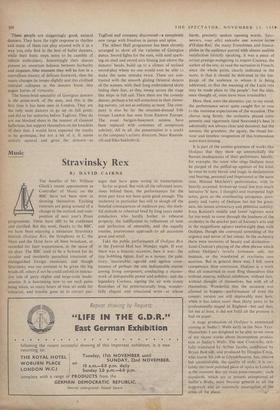M usic
Stravinsky Rex
By DAVID CAIRNS
THE benefits of Mr. William (;lock's recent appointment as Controller of Music on the BBC have not been slow in showing themselves. Exciting rumours are going around of a change in the outlook and com- position of next year's Prom programmes. These have still to be cimfirmed and clarified. But this week, thanks to the BBC, we have been enjoying a miniature Stravinsky festival. Oedipus Rex, the Symphony in C, the Mass and the Octet have all been broadcast, or recorded for later transmission, in the space of six days. The BBC used to be a byword for its cavalier and insolently parochial treatment of distinguished foreign musicians, and though Stravinsky was too eminent to be given the big brush-off, others if not he could unfold an instruc- tive tale of petty slights and large-scale inade- quacies. It is heartening now to see such pains being taken, so many hours of time set aside for rehearsal, and trouble gone to to correct pas-
sages that have gone wrong in transcription.
So far so good. But with all the reformed inten- tions behind them, the performances for the Most part have not been quite good enough. The orchestra in particular has still to slough off the baneful consequences of mediocre pay, the sloth- ful attitude to rehearsal bred by long years under conductors who hardly bother to rehearse properly, the indifference to refinement of tone and perfection of ensemble, and the equally routine, journeyman approach to all occasions great and small.
Take the pubfic performance of Oedipus Rex in the Festival Hall last Monday night. If ever there was a historic occasion, here it was: the tiny hobbling figure, frail as a mouse, the pale, ivory, inscrutable,, age-old and• ageless coun- tenance of perhaps the one indisputable master among living composers, conducting a master- work of indisputable power and nobility; and the legendary Cocteau, signing the air with ironic flourishes of his preternaturally long, wonder- fully elegant and emaciated wrist--at whose harsh, precisely spoken opening words, 'Spec- tateurs, vous allez entendre itne version latine
d'CEdipe-Roi,' the many Frenchmen and franco- philes in the audience purred with almost audible satisfaction (strictly speaking, it was a piece of arrant prestige-mongering to import Cocteau, the author of the text, to read the narration in French, since the whole point, clearly indicated in the score, is that it should be delivered in the lan- guage of the , audience to whom it is being addressed, so that the meaning of the Latin text may be made plain to 'the people'; but the idea, once thought of, must have been irresistible).
Here, then, were the elements; yet, to my mind, the performance never quite caught fire or rose to the immense expectations of the occasion. The chorus sang firmly, the orchestra played com- petently and vigorously (and Stravinsky's beat is admittedly not always clear and decisive), but the tension, the grandeur, the agony, the ritual fer- vour and timeless resignation of this tremendous score were missing.
It is part Of the austere greatness of works like Oedipus that they show up unmercifully the human inadequacies of their performers. Ideally, for example, the tenor who sings Oedipus must be purged of the puffed-up egotism of his kind, he must be truly heroic and tragic in declamation and bearing, personal and impersonal at the same time. Helmut Melchert's .performance, with its heavily accented, broken-up vocal line (too much intrusive 'h' here, I thought) and trumpeted high notes, gave us the overbearing arrogance, pom- posity and vanity of Oedipus but not his great- ness, his innate aristocracy and potential nobilitY. Irma Kolassi's middle and lower registers were far too weak to come through the loudness of the orchestra in the quicker part of Jocasta's aria and in' the magnificent agitato twelve-eight duet with Oedipus, though she conveyed something of the urgency and terror of her musie. In the orchestra there were moments of beauty and distinction-- Janet Craxton's playing of the oboe phrase which echoes Oedipus's invidia fortunum odit. for instance, or the woodwind at reseiturus sum nostrum. But in general there was, I felt, more competence than conviction. Oedipus is a work that all concerned in must fling themselves into without reserve, without inhibition, without fear, without, thought of themselves, but with all of themselves. Wonderful that the occasion' was allowed to happen— performances of even the concert version are still deplorably rare here, while it has taken more than thirty years to be professionally staged in England—but sad that, for the at least, it did not fulfil all the promise it had on paper.
A stage production of Oedipus is announced coming at Sadler's Wells early in the New Year. Meanwhile I am delighted to be able to eat some of my recent words about incompetent produc- tion at Sadler's Wells. The new Cinderella, skil- fully translated by Arthur Jacobs, conducted by Bryan Balkwill, and produced by Douglas Craig, who learnt his job at Glyndebourne, has, elusive but unmistakable, the quality of style; it is cer- tainly the most polished piece of opera in London at the moment. But my main point remains : such standards, which are at present exceptional at Sadler's Wells, must become general to all the stagework and an automatic assumption of the ethos of the place.










































 Previous page
Previous page